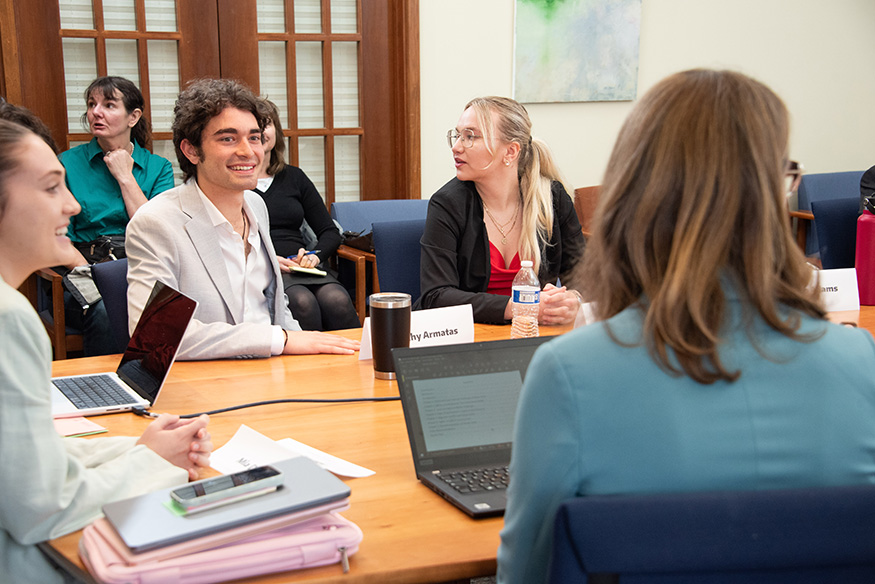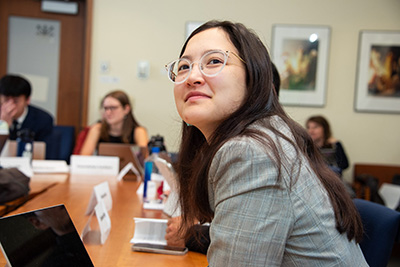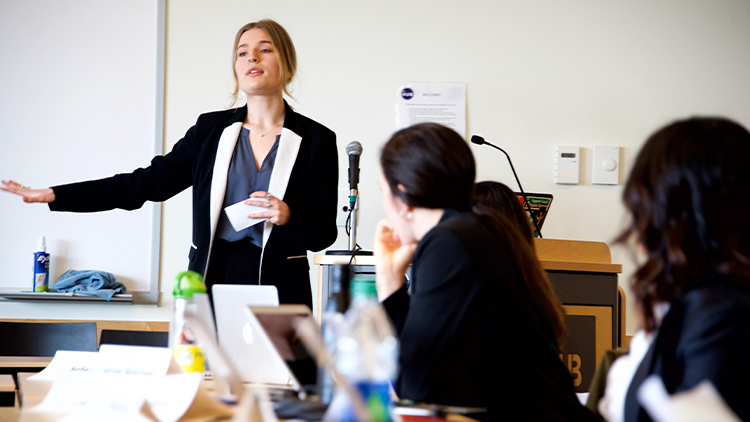
The Henry M. Jackson School of International Studies is a nationally recognized leader in advancing the understanding of and engagement in world issues. Through our interdisciplinary undergraduate and graduate academic and experiential learning programs, we prepare global citizens to lead with a nuanced contextual knowledge of how the world works.
VISIT DEPARTMENT WEBSITEABOUT THE JACKSON SCHOOL
Situated in the Pacific Northwest, we offer unique access to a global hub of innovation, technology and public service research, internships and jobs. Founded in 1909, the School is named for the late Senator Henry M. Jackson, in recognition of his interest and support for the School and the field of international affairs.
Our alumni work in a range of fields, including: the U.S. Foreign Service; major corporations such as Amazon, Microsoft and Starbucks; international agencies like The World Bank, United Nations, and the biggest foundation in the world, the Bill & Melinda Gates Foundation; think tanks; universities, and diplomatic missions of foreign governments.
The Jackson School hosts 21 centers and programs; five of these are U.S. Department of Education-funded National Resource Centers dedicated to education and public service. Four of the Centers award Foreign Language and Area Studies (FLAS) fellowships to students throughout the UW. For Summer 2023 and Academic Year 2023-2024, the Centers awarded a total of 50 FLAS fellowships to UW undergraduate and graduate students.
426
Undergraduate majors
EDUCATION
The Jackson School offers bachelor, master and doctoral degrees. Undergraduates choose from six majors — International Studies (General), Asian Studies, European Studies, Latin American Studies, Comparative Religion or Jewish Studies — and 17 minors. The curriculum is interdisciplinary and focuses on area studies, international policy issues and skill-based learning. Classes are taught by UW faculty and practitioners from both public and private sectors. Study abroad is strongly encouraged.
A highlight of the International Studies major is Task Force, a capstone seminar which requires students to investigate a current global policy issue, write an analysis and make recommendations to external evaluators with expertise on the issue. Other capstones: Advanced Readings, a seminar that includes reading and writing about significant texts on various topics, and an Advanced Readings: Public Writing seminar, which emphasizes editing and workshopping writing for a public audience. Select undergraduate and graduate students also join our Global Research Groups, bringing actionable insights to private and public sector organizations for their strategic and operational objectives.
We offer 10 programs that lead to a master’s degree. The International Studies program has the broadest focus and is often pursued concurrently with professional degree programs in business administration, marine affairs, forest resources, public affairs, law, or public health.
The PhD in International Studies trains scholars and practitioners with deep knowledge of areas in the context of contemporary global themes, policy challenges and real-world problems. Our PhD allows for a three-year program of completion.
Jackson School Career Services provides a bridge from the classroom to the workplace by promoting professional development opportunities, providing career coaching appointments, and hosting workshops and events that highlight diverse career paths. Although not all alumni pursue international careers, many have a global aspect within their jobs in the public, private, and nonprofit or nongovernmental sectors..
Our Academic Programs
undergraduate majors, minors and/or graduate studies

- International Studies (general major/minor)
- Human Rights (tri-campus minor)
- African Studies
- Arctic Studies
- China Studies
- Comparative Islamic Studies
- Comparative Religion Studies
- East Asia Studies
- European Studies
- Hellenic Studies
- Japan Studies
- Jewish Studies
- Korea Studies
- Latin American & Caribbean Studies
- Middle East Studies
- Portuguese Language & Luso-Brazilian Studies
- Russian, East European and Central Asian Studies
- South Asian Studies
- Southeast Asian Studies
Students
December 2024
- 426 Undergraduate majors
- 114 Undergraduate minors
- 95 Graduate Students
Degrees Awarded
Sept. 2023 - Aug. 2024
- 153 Bachelor of Arts
- 31 Master of Arts
- 3 PhD
Major Student Awards
since 2015
- David L. Boren Fellowship
- Carnegie Junior Fellowship
- Charles B. Rangel Fellowship
- Fulbright-Hays Doctoral Dissertation Fellowship
- Fulbright Research Fellowship
- Fulbright U.S. Scholar Award
- German Academic Exchange Service (DAAD)
- German Development Institute Visiting Researcher
- Harry Frank Guggenheim Emerging Scholar Award
- Henry M. Jackson Foundation Doctoral Fellowship
- Inter-American Foundation Grassroots Development Field Research Fellowship
- National Science Foundation Undergraduate Research Experience Fellowship
- Social Science Research Council Mellon International Dissertation Research Fellowship
- UW College of Arts and Sciences Dean’s Medalist
- UW College of Arts and Science Graduate Medalist
- UW Mary Gates Research Award
- UW HUSKY 100 List
- UW Bonderman Travel Fellowship
- U.S. State Department Critical Language Scholarship
- Yenching Academy Award
FACULTY

Autumn 2022
- 25 Professors
- 15 Associate Professors
- 6 Assistant Professors
- 6 Lecturers
- 5 Professors Emeriti
- 18 Visiting Lecturers
- 26 Affiliate Academic Faculty
Jackson School faculty represent a broad spectrum of social science disciplines. They are also associated with other departments in the College of Arts and Sciences and other schools and colleges at UW, including the College of the Environment, School of Law, and the Michael G. Foster School of Business. Honors include:
Faculty Honors
- UW Distinguished Teaching Award
- UW Distinguished Graduate Mentor Award
- UW Outstanding Public Service Award
- UW Distinguished Staff Award
- UW Undergraduate Research Mentor Awards
- UW James D. Clowes Award for the Advancement of Learning Communities
- UW Alumni Association “Last Word” Lecture Award
- Governor’s Writers Award
- World Educator Award, World Affairs Council
- John Simon Guggenheim Memorial Fellowship
- U.S. Institute for Peace Senior Fellowship
- Lifetime Achievement Award, Association for Asian Studies
- Chevalier de l’Ordre du Mérite Agricole, Republic of France
- Third Order of the Rising Sun, Government of Japan
- Fulbright-Nehru Senior Research Fellowship
- Fulbright-Hays Faculty Research Fellowship
- Fulbright-Nehru Academic and Professional Excellence Award
- Fulbright-Hays Summer Seminar Abroad
- National Endowment for the Humanities Research Grants
- National Science Foundation Research Grant
- President, Association for Asian Studies
- President, Association for Israel Studies
- President, Association for Jewish Studies
- President, Association of Populations Centers
- President, Association for Professional Schools of International Affairs
- President, Turkish Studies Association
- President, World History Association
- Editor, Journal of Asian Studies
- Editor, Journal of Japanese Studies
- Editor, Journal of Korean Studies
RESEARCH
The Jackson School offers leading-edge research in global and area studies. Our internationally prominent faculty represent a range of fields in the social sciences and humanities, including anthropology, economics, geography, history, political science, religion, sociology, and gender, women & sexuality studies. Some notable research projects include: the effects of free-trade agreements on human rights; public health and environmental security; nuclear non-proliferation in Asia; civil society in Asia, Latin America and Europe; defense industrialization in China; the relationship between religion and violence; U.S. foreign policy in the Middle East; history of U.S. foreign policy; the Mexican Revolution; political economy of India, post-Soviet politics; and politics of indigenous communities.
OUTREACH
Each year the Jackson School and its centers and programs sponsor dozens of academic and public conferences, lectures and cultural events featuring scholars, NGOs, business and diplomats from around the world. In addition, the School’s International Policy Institute, which was established with a grant from Carnegie Corporation of New York, brings together academics and policymakers to tackle pressing global topics such as cybersecurity, the Disability Inclusive Development Initiative, religion, and the Arctic.
Our 21 centers and programs provide ongoing education opportunities for K-12 and community college educators via workshops, lectures, partnerships with media and international study tours. They offer up-to-date information and recommendations on global education resources and support in planning international curricula and activities.
National Resource Centers
- Canadian Studies Center
- East Asia Center
- Center for Global Studies
- South Asia Center
- Center for Southeast Asia & its Diasporas
Other Centers & Programs
- African Studies
- Arctic and International Relations
- Comparative Religion
- Center for Human Rights
- Center for Korea Studies
- Center for European Studies
- East Asia Resource Center
- Ellison Center for Russian, East European and Central Asian Studies
- European Union Center
- Japan Studies
- Latin and American Caribbean Studies
- Middle East Center
- Stroum Center for Jewish Studies
- Taiwan Studies
WHAT'S IN A NAME? A JACKSON SCHOOL TIMELINE
- 1909: The Jackson School begins as the Department of Oriental Subjects.
- Post WW II: The Department becomes the Far Eastern and Russian Institute.
- 1978: The Institute is named the School of International Studies
- 1983: The School's current name is adopted in recognition of the interest and support that the late Senator Jackson had given to the School and the field of international affairs.
CONTACT
The Henry M. Jackson School of International Studies
Box 353650
University of Washington
Seattle, WA 98195
(206) 543-4370
jsis.washington.edu
last update: December 2024